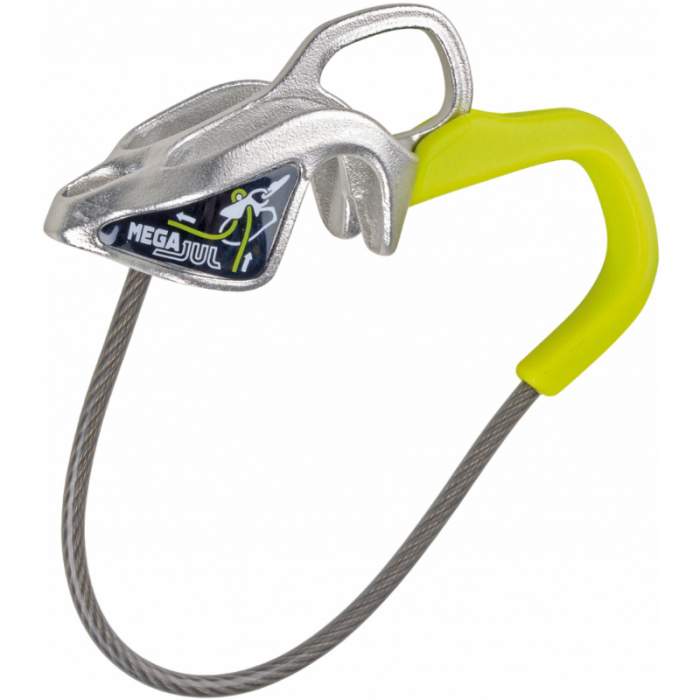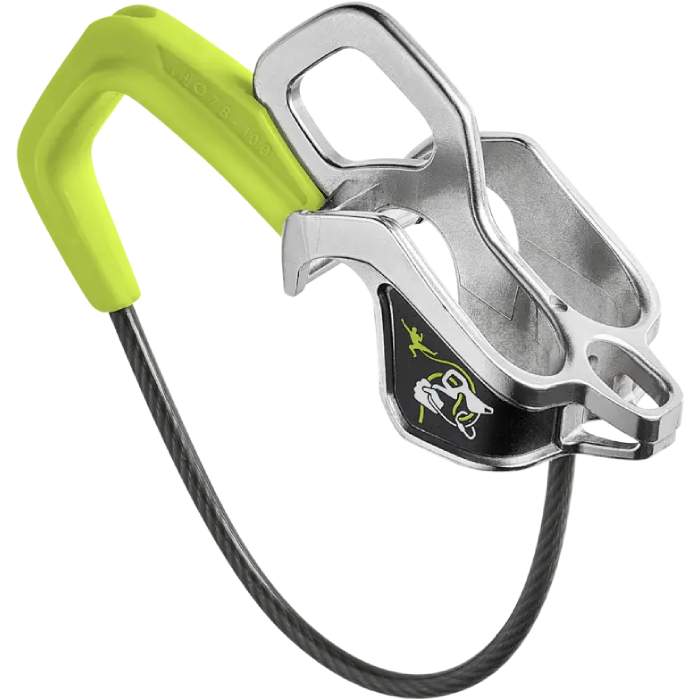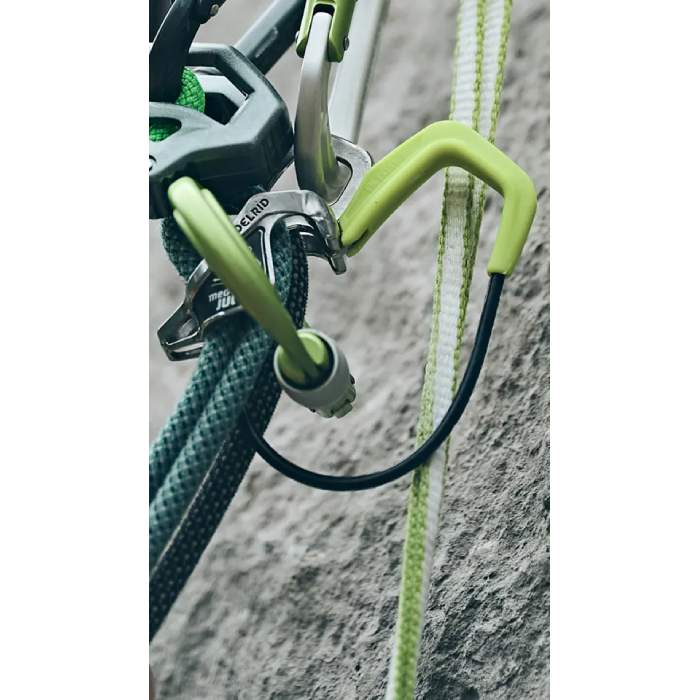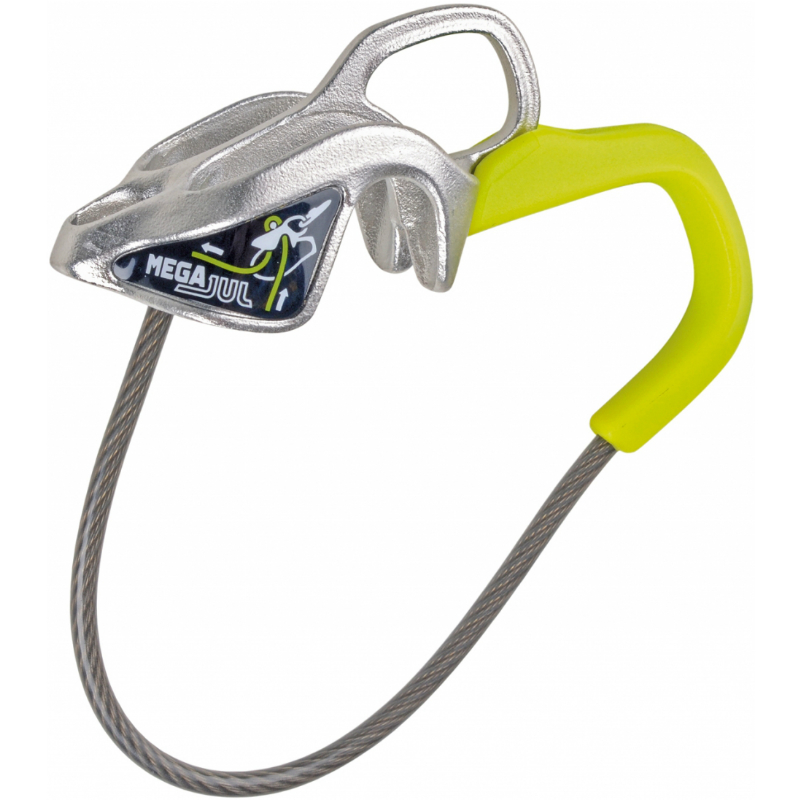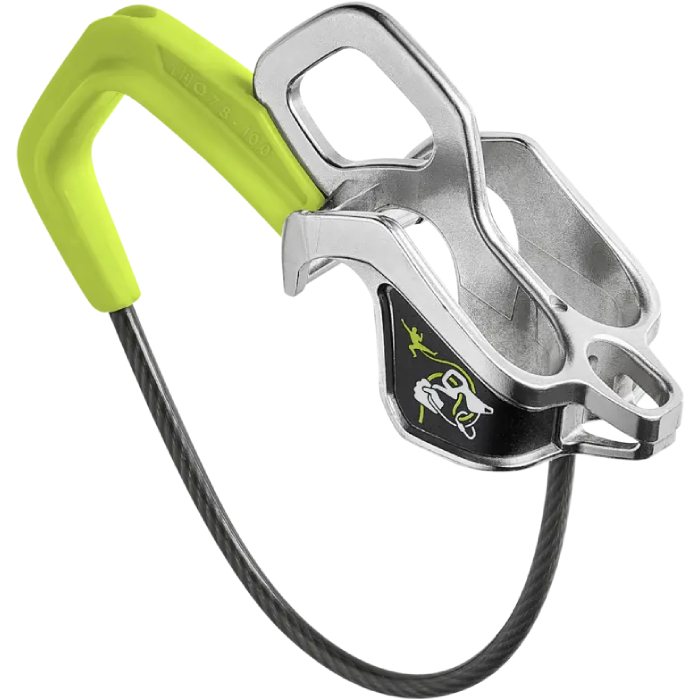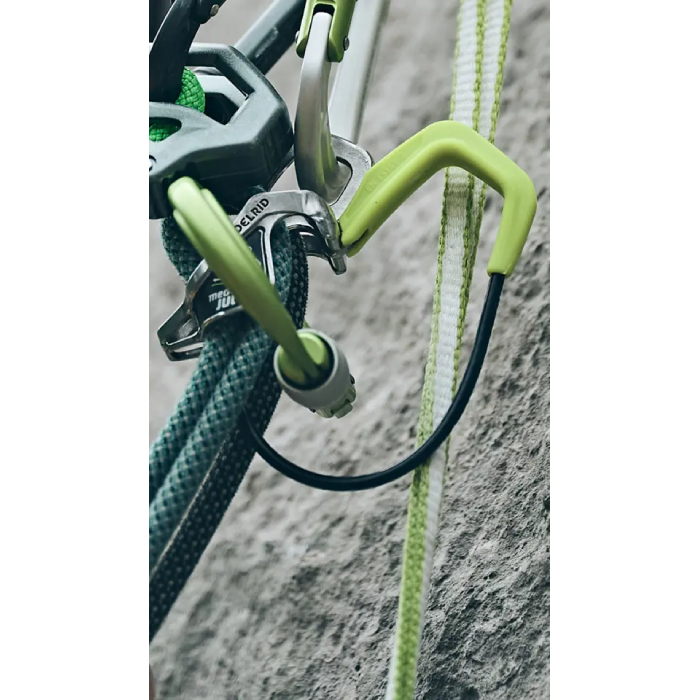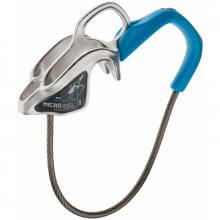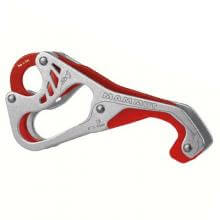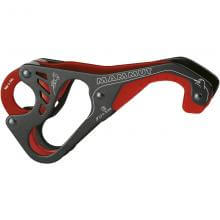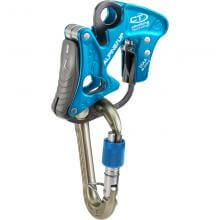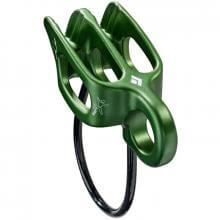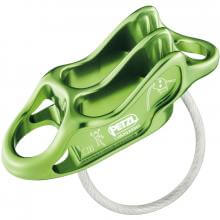Mega Jul 2023
Description
Our most versatile belay and abseil device made of solid stainless steel for durability.
For belaying a leader or bringing up 2 seconds, also suitable for abseiling
Very lightweight construction
High braking performance assists the belayer with leader falls
Small eyelet for releasing unit with a carabiner when bringing up your partner
Rope can be paid out faster to a leader by holding device in the “open” position with the thumb
Retail price
This Product is Hard to Find.
We don’t know where you can buy this item online in the US. We’ll continue to check all the major retailers and will update this page as soon as we find one.
If you know where to find this online in the US, let us know, and we’ll add the link.


Device Type  Device TypeTubeThe most commonly used belay type also called an “ATC” or “tuber.” Other than a distinction between other belay device types, “Tube” is a rarely used term, most climbers just assume you're talking about this style when they refer to your "belay device." 
Figure 8Mostly used in rescue, canyoneering, tactical, work safety, or by old school climbers and rappellers. One reason they went out of popularity with recreational climbers is because they tend to create twists in the rope. 
Brake AssistThese devices assist in stopping the rope when a climber falls or hangs on the rope. 
Often referred to as “auto-blocking” but that’s not the official terminology because no belay device should be assumed to work automatically by itself, even if it feels like it does (or does most the time). PlateWhen simplicity is a must, or you started climbing before Tubers were the norm. Bonus: They tend to be very light weight. 
DescenderFor rappelling, not for belaying a lead climber or top-roping. 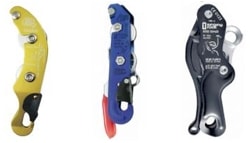 |
Brake Assist - Tube |
Weight (g)  Weight (g)In grams, the weight, as stated by the manufacturer/brand. |
65 g |
Belay Brake Assist  Belay Brake AssistThis is when the belay device significantly reduces the amount of holding power the belayer must exert to stop a fall and hold a climber. This is also called "assisted-braking" as the device must hold a significant amount of the climber’s weight; this term does not include friction-adding "teeth" found on some tube style belay devices. Confusingly referred to as “auto-blocking” or “auto-locking” these terms wrongly imply the device will always, automatically, stop a fall or hold a climber even if the belayer/rappeller is hands-free. These devices are not meant to be used without a hand on the braking side of the rope; the belayers/rapppeller brake hand should always be on the brake rope. Worth ConsideringMost of the mechanical brake assist devices only hold a single strand of rope and are not capable of double-strand rappelling (the most common method of rappel). |
Yes |
| Rope Options | 1 or 2 ropes |
Guide Mode  Guide ModeThis is when you belay directly off the anchor instead of your harness. Guide mode is helpful if you climb outdoors a lot because it reduces the holding power required from the belayer. When your partner falls or rests, the weight of the climber is held mostly by the anchor and the belay device. Tubers and PlatesWhen belaying in "guide mode," the tubers and plates turn auto-blocking. During a fall, the climbing rope pinches the slack rope, completely stopping the movement of either rope. A common guide mode setup shown below. 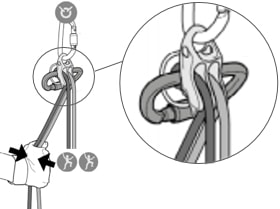
Mechanical Brake Assist DevicesThere is no difference in the functionality of the device. A brake-hand should always be on the rope to ensure the climber is caught in the case of a fall. A common guide mode setup shown below. 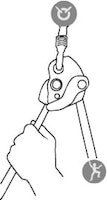
Where guide mode is used
Learn Morehttp://www.climbing.com/skill/essential-skills-auto-blocking-belay-devices/ |
Up to 2 followers |
Teeth  TeethTeeth are only seen on tube devices. They add friction that helps grip the rope for more belaying control. This is helpful for belaying heavier climbers. Teeth are becoming standard on new tube devices. 
Worth ConsideringTeeth do wear out. You can limit wear by rappelling on the side without teeth (if you don’t need the extra friction). Once they’re worn, you’ll still have a usable belay device, just less friction. |
No |
Rope Range (mm)  Rope Range (mm)The range of rope diameters, in millimeters, that the manufacturer/brand specifies can safely be used. This is the best case scenario and does not necessarily take into consideration that certified ropes have a tolerance of +/- .3 mm. Recently, manufacturers have started to add an "optimized" rope range -- this is the range that will result in the nicest handling of the belay device. | 7.9 mm
- 10.5 mm
single 8.9 - 10.5 half 8.5 - 10.5 twin 7.9 - 10.5 |
Certification  CertificationsThe main climbing gear certifications are CE and UIAA--and normally the UIAA creates the rules that the CE body also supports. When possible, we try to list all the certifications the product carries. To sell a climbing product in Europe, the device must be CE certified. There are no official requirements to sell climbing gear in the US. The UIAA certification is a voluntary process. Learn MoreRock and Ice Certifications Guide |
|
Previously this device had different rope ranges listed (and you'll hear different rope ranges on Edelrid's and WeighMyRack's videos about this product). The rope ranges written previously were safe to use, but these more recent numbers will ensure better handling.
No reviews yet.
The Edelrid Mega Jul comes as close to being a do-it-all, one-stop-shop no-drop belay/rappel device as any I’ve ever seen. This multifunctional tube-style device is super light, feeds slack to a leader much more quickly than other devices in its category, and can be used in a number of different configurations that increase its braking power to a degree on par with mechanical auto-locking devices.
The Mega Jul is a cleverly designed belay/rappel device that can do more than any other device and weigh less at the same time. With all its impressive abilities, is this device a game-changer?
It’s tempting to think so. I’m using it at the crag like a GriGri; it not only performs the same functions, but it’s easier to keep it from locking up while feeding slack. And since it weighs 61% less than a GriGri and can be used to rappel as well, I won’t hesitate to use it on a hard multipitch when I want a device that auto-locks while belaying a leader. Additionally, this device offers the unprecedented option for auto-locking on a two-rope rappel, eliminating the need for a backup friction hitch.
The descriptions of what this device is capable of are in no way intended to be instructional. This is a very simple design and device that with proper instruction and knowledge can do some amazing things. Because it can be used in so many different orientations with different results, this is not the simplest device for a new climber which may be its biggest drawback. For experienced and knowledgeable climbers this device opens up worlds of opportunity and flexibility in a very small, lightweight package.
The Edelrid Mega Jul is a ‘guide plate’ type of belay device. That is: it can be used for locking off your second with two screwgates. The top ring is well situated and you need to be careful to read the instructions on the side of the Jul in order to get it right. In fact I would say that the Mega Jul is more of an ‘expert’ belay device than one for beginners as it needs to be used in two different positions. The green thumb ring needs to be at the bottom for normal belaying and at the top for using in guide mode.
The Edelrid Mega Jul comes as close to being a do-it-all, one-stop-shop no-drop belay/rappel device as any I’ve ever seen. This multifunctional tube-style device is super light, feeds slack to a leader much more quickly than other devices in its category, and can be used in a number of different configurations that increase its braking power to a degree on par with mechanical auto-locking devices.
Once we finally got our hands on one of these nifty little tube-style belay devices, our testers were over the moon for its unbeatable versatility and additional stopping power. It’s light (2.3 oz.), and the smartly designed shape makes it bite down on the rope during a fall—just like an assisted-braking belay device (think Grigri or Cinch). You get all the features of an auto-blocking tube (two-rope rappels, guide mode for following, belaying) with the increased safety of those other mechanical devices. “When my partner took the big ride off his project in Clear Creek Canyon, it caught the rope just as well as my Grigri, but when we went to hop on the four-pitch Playin’ Hooky, I could still use it to belay him in auto-block mode from the top, as well as do the four rappels,” one Colorado tester said. The Mega Jul is made of stainless steel, which is more durable than other tube devices that utilize aluminum. (Take a look at your aluminum tube-style device right now. Chances are that there are some sharp grooves forming on the brake side.) Plus, it offers two rappel modes: one that works like normal when your weight and gravity move the rope through the device and one that utilizes the assisted-braking feature. This rappel mode locks the
rope off and keeps you from moving down unless you put the nose of a carabiner in a specialized hole, and then use the biner as a handle to lever the device, which allows the rope to move through and you to move down. The one teeny-tiny nitpick is that it’s best to have someone show you how to use the device since it’s so unique—or watch a video: climbing.com/megajul.
- ‹ previous
- 2 of 2
If you know of a good product video that should be here, let us know, and we'll put it up.
If you're looking for gear videos in general, check out our Vimeo and YouTube channels to see the newest gear.

